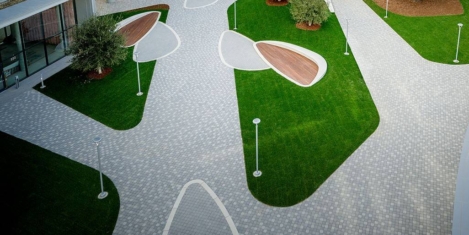January 4, 2019
CIPD highlights gap between ‘fat cat’ top earners and the rest of the workforce
 Just three days into the New Year, today (Friday 4 January), the UK’s top bosses will have made more than a typical full-time worker will earn in the entire year, according to calculations from independent think tank the High Pay Centre and the CIPD. The average (median) full-time worker in the UK earns a gross annual salary of £29,574, while the average FTSE 100 CEO, on an average (median) pay packet of £3.9 million, only needs to work until 1pm on Friday 4 January 2019 to earn the same amount. The £3.9 million figure was calculated by the CIPD and the High Pay Centre in their 2018 analysis of top pay and it marks an 11% increase on the £3.5 million figure reported in their 2017 analysis. The pay increase means that FTSE 100 CEOs, working an average 12-hour day, will only need to work for 29 hours in 2019 to earn the average worker’s annual salary, two hours fewer than in 2018.
Just three days into the New Year, today (Friday 4 January), the UK’s top bosses will have made more than a typical full-time worker will earn in the entire year, according to calculations from independent think tank the High Pay Centre and the CIPD. The average (median) full-time worker in the UK earns a gross annual salary of £29,574, while the average FTSE 100 CEO, on an average (median) pay packet of £3.9 million, only needs to work until 1pm on Friday 4 January 2019 to earn the same amount. The £3.9 million figure was calculated by the CIPD and the High Pay Centre in their 2018 analysis of top pay and it marks an 11% increase on the £3.5 million figure reported in their 2017 analysis. The pay increase means that FTSE 100 CEOs, working an average 12-hour day, will only need to work for 29 hours in 2019 to earn the average worker’s annual salary, two hours fewer than in 2018.

















 Given the latest U turn regarding Brexit, with beleaguered British Prime Minister Theresa May announcing the cancellation of a commons vote on the agreement, a new report into the so called “glass cliff” appointment of women is pretty timely. The term “glass cliff” was coined by researchers Ryan and Haslam in the early 2000s to describe a phenomenon in which women are more likely than men to be promoted to precarious management positions with a higher risk of failure. Aside from May, exemplar cases often used to support the theory include Marissa Mayer, former CEO of Yahoo and Andrea Nahles, Social Democrat party leader in the German Bundestag.
Given the latest U turn regarding Brexit, with beleaguered British Prime Minister Theresa May announcing the cancellation of a commons vote on the agreement, a new report into the so called “glass cliff” appointment of women is pretty timely. The term “glass cliff” was coined by researchers Ryan and Haslam in the early 2000s to describe a phenomenon in which women are more likely than men to be promoted to precarious management positions with a higher risk of failure. Aside from May, exemplar cases often used to support the theory include Marissa Mayer, former CEO of Yahoo and Andrea Nahles, Social Democrat party leader in the German Bundestag. 




 One year on from #MeToo – just one in four workers agree that international media coverage has helped to improve their workplace culture, according to new research on sexual harassment from Acas. The workplace experts commissioned the study from YouGov to find out whether media reporting on #MeToo and high-profile celebrity cases have had any effect on British workplaces. Only a third (30 percent) of survey respondents believe that incidents of sexual harassment in workplaces have decreased in the last five years.
One year on from #MeToo – just one in four workers agree that international media coverage has helped to improve their workplace culture, according to new research on sexual harassment from Acas. The workplace experts commissioned the study from YouGov to find out whether media reporting on #MeToo and high-profile celebrity cases have had any effect on British workplaces. Only a third (30 percent) of survey respondents believe that incidents of sexual harassment in workplaces have decreased in the last five years. 


 Only one in four organisations have adapted performance management processes to consider staff with disabilities and special needs, including conditions such as dyslexia and autism. These are the findings of research carried out by Acas which has today published new advice to address the issue. The research report entitled ‘Improvement required?’ included a survey, which asked employers about performance management systems within their workplaces. The study found that one in ten employers said that their performance management system was demotivating for staff; and only one in ten employers said that their systems were used for planning and monitoring training and development.
Only one in four organisations have adapted performance management processes to consider staff with disabilities and special needs, including conditions such as dyslexia and autism. These are the findings of research carried out by Acas which has today published new advice to address the issue. The research report entitled ‘Improvement required?’ included a survey, which asked employers about performance management systems within their workplaces. The study found that one in ten employers said that their performance management system was demotivating for staff; and only one in ten employers said that their systems were used for planning and monitoring training and development.








January 3, 2019
Anti-team legislation can make us slaves to individual rights
by Helen Jamieson • Comment, Flexible working, Workplace
Society is becoming more selfish. At least that’s what the most commonly held view on the issue suggests, and it’s only set to get worse. Whether or not you believe the headlines, my 20 plus years’ experience as an HR consultant has led me to believe the hype. Increasingly many (I stress, not all) employees no longer see themselves as part of a team, but are increasingly ‘lone wolves’ single mindedly pursuing their needs and wants above those of the team. Each decision they make is with ‘I’ first and foremost, with ‘we’ maybe just a passing thought. It could be argued this was inevitable. How do you create a culture of team engagement, and group morale when for decades UK workplace legislation has focused almost exclusively on Individual Rights, rather than the ‘rights’ of the group? I’d argue it is simply not possible to develop successful teams where each individual has numerous legal rights but no corresponding responsibilities. My wish for 2019 would be for the government to set out a ‘responsibility’ alongside every ‘right’ it confers.
(more…)